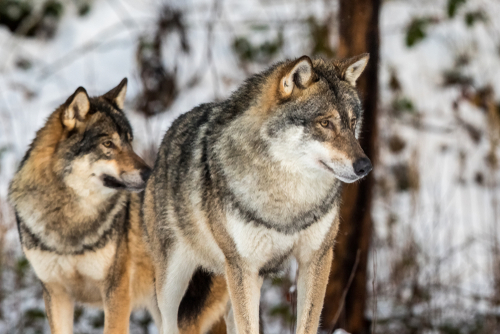Lawsuit over killing of Idaho gray wolves can proceed, 9th Circuit rules

Photo by Lillian Tveit/Shutterstock.com.
A federal appeals court has reinstated a lawsuit challenging the U.S. Department of Agriculture’s Wildlife Services for killing gray wolves in mountainous parts of Idaho without updating the potential impact under the National Environmental Policy Act.
In its opinion, filed April 23, the 9th U.S. Circuit Court of Appeals at San Francisco held that five conservation groups that filed the 2016 lawsuit adequately described how the federal government’s “wolf-killing activities threatened their aesthetic and recreational interests in tracking and observing wolves in the wild,” which falls under the scope of the NEPA. The Spokesman-Review and Courthouse News Service have coverage.
The NEPA “is intended to help public officials make decisions that are based on understanding of environmental consequences and take actions that protect, restore and enhance the environment,” according to the opinion. Under the law, federal agencies are required to assess and publicly disclose the environmental impact of their proposed actions.
The Idaho Department of Fish and Game maintains responsibility for managing gray wolves in the state but requests assistance from the USDA’s Wildlife Services when its primary method of sport hunting fails to meet its goals, the opinion says.
Wildlife Services last conducted an environmental assessment related to its involvement in gray wolf management in Idaho in 2011, prior to the delisting of gray wolves from the Endangered Species Act and other changes that followed, the opinion says.
District Judge Edward Lodge of the District of Idaho had dismissed the lawsuit, holding that the Western Watersheds Project, the Center for Biological Diversity, the Friends of the Clearwater, the WildEarth Guardians and the Predator Defense did not prove that their injuries were redressable because Idaho could engage in the same wolf-killing activities without the federal government.
In its reversal, the 9th Circuit held that if Wildlife Services was to cease its activities, even temporarily, it is possible that fewer gray wolves would be killed.
“Wildlife Services itself has stated that, without its assistance, ‘implementation of both lethal and nonlethal [wolf management] methods by other entities would likely not be as effective,’ ” the court said. “Likewise, additional NEPA analysis could change Wildlife Services’ activities in the long term. Among other possibilities, Wildlife Services could decide, in its discretion, to kill fewer wolves or to use only nonlethal means of wolf management moving forward. Any of these outcomes would protect plaintiffs’ interests.”
The 9th Circuit remanded the case back to the district court “for further proceedings.”



